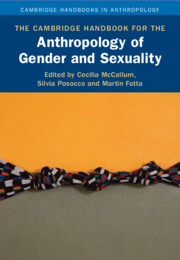Book contents
- The Cambridge Handbook for the Anthropology of Gender and Sexuality
- Cambridge Handbooks in Anthropology
- The Cambridge Handbook for the Anthropology of Gender and Sexuality
- Copyright page
- Contents
- Contributors
- 1 Introduction to The Cambridge Handbook for the Anthropology of Gender and Sexuality
- Part One Openings and Orientations
- 2 Remixing Feminist Epistemology and Methodology
- 3 Critical Ethnography as a Collective Feminist Project
- 4 Kinship and Relatedness as Vital Lens
- 5 Reframing the Social, Rethinking the Body, Confronting Biologism
- Part Two Knowledges and Domains
- Part Three Resistances and Intersections
- Part Four Desires and Relations
- Part Five Recursivities and Futures
- Name Index
- Subject Index
- References
2 - Remixing Feminist Epistemology and Methodology
from Part One - Openings and Orientations
Published online by Cambridge University Press: 29 September 2023
- The Cambridge Handbook for the Anthropology of Gender and Sexuality
- Cambridge Handbooks in Anthropology
- The Cambridge Handbook for the Anthropology of Gender and Sexuality
- Copyright page
- Contents
- Contributors
- 1 Introduction to The Cambridge Handbook for the Anthropology of Gender and Sexuality
- Part One Openings and Orientations
- 2 Remixing Feminist Epistemology and Methodology
- 3 Critical Ethnography as a Collective Feminist Project
- 4 Kinship and Relatedness as Vital Lens
- 5 Reframing the Social, Rethinking the Body, Confronting Biologism
- Part Two Knowledges and Domains
- Part Three Resistances and Intersections
- Part Four Desires and Relations
- Part Five Recursivities and Futures
- Name Index
- Subject Index
- References
Summary
This chapter centers voices that are traditionally excluded from the anthropological canon in order to read a feminist praxis back into anthropology’s feminist theory and methodology. The authors excavate key debates and practices that yield insight into the liberatory potentiality of feminist anthropology. First, they explore questions around gender, sexuality, and the authority of the knowledge producer. Then, they query how the sexual and gendered mythos of the researcher clings to their research and the way the researcher is integrated into the field of anthropology, taking examples from anthropological history and debates around auto-ethnography. The third section explores how self-knowledge folds into feminist traditions of situated knowledges, particularly as it is engaged by Black feminist anthropologists, women of color, and queer thinkers. The fourth section revisits the work of performance and choreography in our field, navigating the political forces and forms of embodiment revealed through these methodological approaches. The chapter ends by drawing together questions of authority, autoethnography, situated knowledge, and the high stakes of performance through the case of sexual and gender-based violence to illustrate methodological and epistemological possibilities within anthropological research.
- Type
- Chapter
- Information
- Publisher: Cambridge University PressPrint publication year: 2023

